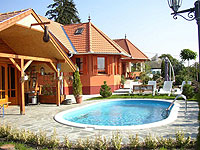Tax on property income in Hungary
Tax Rate on Rental Income |
|||
| Monthly Income | US$1,500 | US$6,000 | US$12,000 |
| Tax Rate | 15% | 15% | 15% |
| Click here to see a worked example | |||
| Source: Global Property Guide research |
|||
INDIVIDUAL TAXATION
Nonresidents are taxed only on their Hungarian-sourced income. Married couples are taxed separately.
Income Tax

There are several categories of aggregated income, as follows: (1) income from independent business activities; (2) income from dependent activities (e.g. employment income); and (3) other income. The income tax is levied at a flat rate of 15%.
Rental Income
Rental income is taxed at a flat rate of 15%. The taxable income can be computed by:- Deducting expenses actually incurred and documented in the renting process such as lighting, maintenance, administrative costs, etc.
- Or by deducting a 10% notional deduction from the gross income (10% expense ratio).
Capital Gains
Net capital gains realized by nonresident individuals on sale of real estate are taxed at a flat rate of 15%. Acquisition costs and related expenses, improvement costs, and cost of transferring the property can be deducted from the revenue to arrive at the net capital gains. If the deductible expenses are not documented and if the acquisition costs are not substantiated, the 15% rate will be applied to 25% of the gross proceeds.The taxable gain is reduced by 10% every year after the fifth year, so that in the fifteenth year after acquisition, the taxable gain is reduced to zero (i.e. 10% reduction in the 6th year after the year of acquisition, 20% in the 7th year, 30% in the 8th year, 40% in the 9th year, 50% in the 10th year, etc.).
PROPERTY TAX
Note that the local government may or may not levy such taxes, and also that the rates vary for each municipality. This may be an important factor to consider, when choosing a property.
Building Tax
The building tax may be imposed by the local government, payable by the property owner each year. The rates and the tax base vary from each locality/municipality, subject to:
- A maximum of HUF1,100 (€3.60) on a per square metre basis or
- A maximum of 3.6% on the market value of the building
Land Tax
Land Tax may be levied on idle land on the portion classified as a "downtown area" by the local government council. The council either levies the tax as:
- Per square metre of the plot at the maximum rate of HUF200 (€0.65) per sq. m.,
- Or on the adjusted market value of the property, in which case the maximum tax rate is set at 3%. Adjusted market value is generally 50% of the market value of the property.